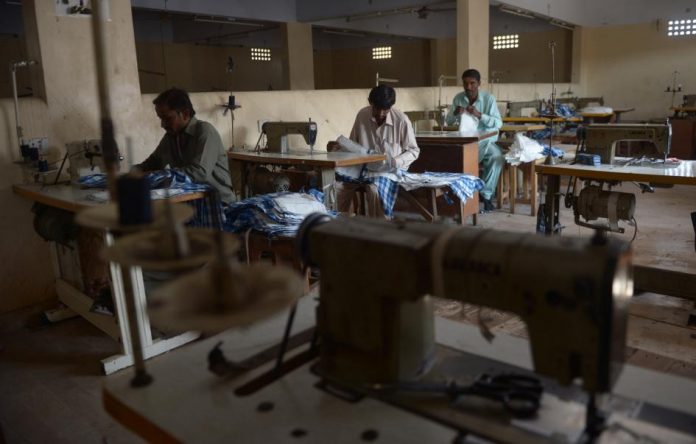Pakistan’s government is failing to enforce laws that could protect millions of garment workers from serious labor rights abuses, Human Rights Watch said in a report released on Wednesday.
The 73-page report, “‘No Room to Bargain’: Unfair and Abusive Labor Practices in Pakistan,” documents a range of violations in garment factories in the country which include a “failure to pay minimum wages and pensions, suppression of independent labor unions, forced overtime, insufficient breaks, and disregarded regulations requiring paid maternity and medical leave”.
HRW interviewed more than 140 people for the report, including 118 garment workers from 24 factories in Pakistan, as well as union leaders, government representatives, and labor rights advocates. Most of the field research for this report in Pakistan from June 2017 to December 2018.
The human rights watchdog has also identified problems in the government’s labor inspection system. Pakistan authorities should revamp labor inspections and systematically hold factories accountable for abuses, it argues.
“Pakistan’s government has long neglected its obligations to protect the rights of the country’s garment workers,” said Brad Adams, Asia director. “Prime Minister Imran Khan’s government should urgently enforce the labor laws and adopt new policies to protect workers from abuse.”
In September 2012, a fire at the Ali Enterprises garment factory in Karachi killed at least 255 workers and injured more than 100. Investigations found a series of irregularities and an almost complete absence of fire and safety systems. Survivors reported that the management made no immediate efforts to rescue the workers and instead attempted to save their merchandise first.
In recent years, Pakistani garment workers have expressed serious grievances through strikes and protests. In December 2018, garment workers protested at a training institute in Lahore run by a major Pakistani brand, which they said abused a government incentive program. Workers alleged that the training institute actually operated as a factory, extracting free labor from “trainees.” In May 2017, workers protested after Khaadi, a leading Pakistani apparel brand, fired 32 workers for demanding their rights under Pakistani law.
Some of the larger factories in Pakistan, which are part of the organized sector of the industry, supply international apparel brands. But most garment factories in Pakistan cater to the domestic market, with the work carried out in small unregistered workshops in unmarked buildings that escape labor inspectors’ scrutiny.
The working conditions in these smaller factories are usually worse than those in larger ones that are more likely to be inspected, HRW found. Owners often refuse to pay the statutory minimum wage and hire workers on short-term oral contracts. However, HRW has documented “violations of labor rights including long working hours and extended temporary employment without job security or benefits even in large Pakistani factories, including some that supply garments to international retailers and brands”.
Workers, many of them women, said that they experienced verbal abuse, were pressured not to take toilet breaks and were even denied clean drinking water. People demanding their rights could be threatened or fired, they related. In two factories, HRW documented beatings of workers by managers.
“I know that the payment is below the government minimum wage, but who will hear our complaint?” said a worker who earns about $90 a month after eight years. “If I protest to the manager, I will be fired in a heartbeat.”
Some garment factories producing for domestic brands use home-based workers for special orders or on a seasonal basis. Women working from home are often denied labor law protections, the report argues. They are not able to join factory unions or unionize, and their work remains unregulated and vulnerable to middlemen, who often refuse to pay minimum wage.
Labor rights activists described union-busting by many large factories. Factory managers often keep workers on short-term contracts to discourage their participation in union activities. Workers also alleged that factory owners manipulate the labor law to create obstacles to register trade unions. Several factories register fake or “yellow” unions consisting of chosen or non-existent employees, making it close to impossible for workers to register real unions.
Pakistan should amend its labor law to comply with international standards including the International Labour Organization (ILO) conventions, HRW asserts. In the interim, rigorous enforcement of the existing law would go a long way in protecting workers’ rights, it said. Labor inspectors and other authorities are frequently overstretched, or complicit, and let abuses persist.
Factory owners also need to make a commitment to reform, HRW said. The All Pakistan Textile Mills Association (APTMA) and the Pakistan Readymade Garments Manufacturers & Exporters Association (PRGMEA) should ensure compliance with worker protection provisions, and sanction companies that abuse worker rights.
Under the United Nations Guiding Principles on Business and Human Rights, domestic and international apparel brands and factories supplying them have responsibilities to prevent and mitigate human rights abuses in factories and should take remedial action if abuses occur. All businesses, regardless of their size or where they are based, should “avoid causing or contributing to adverse human rights impacts through their own activities, and address such impacts when they occur,” the guiding principles say.
“The Pakistani government should ensure that garment factories stop using union-busting and other strategies to prevent workers from organizing and collectively demanding their rights,” Adams said. “Domestic and international brands should recognize that respecting worker rights makes for more competitive businesses.”




